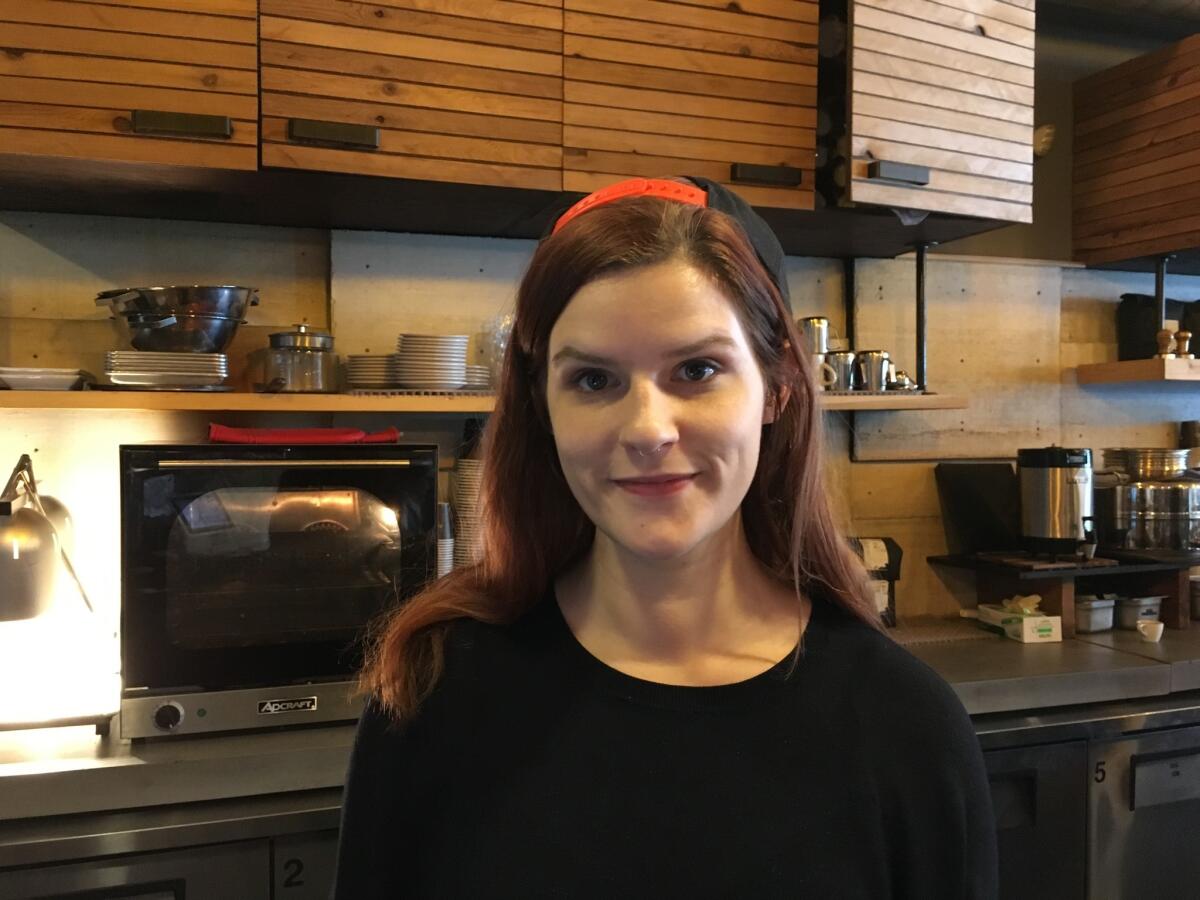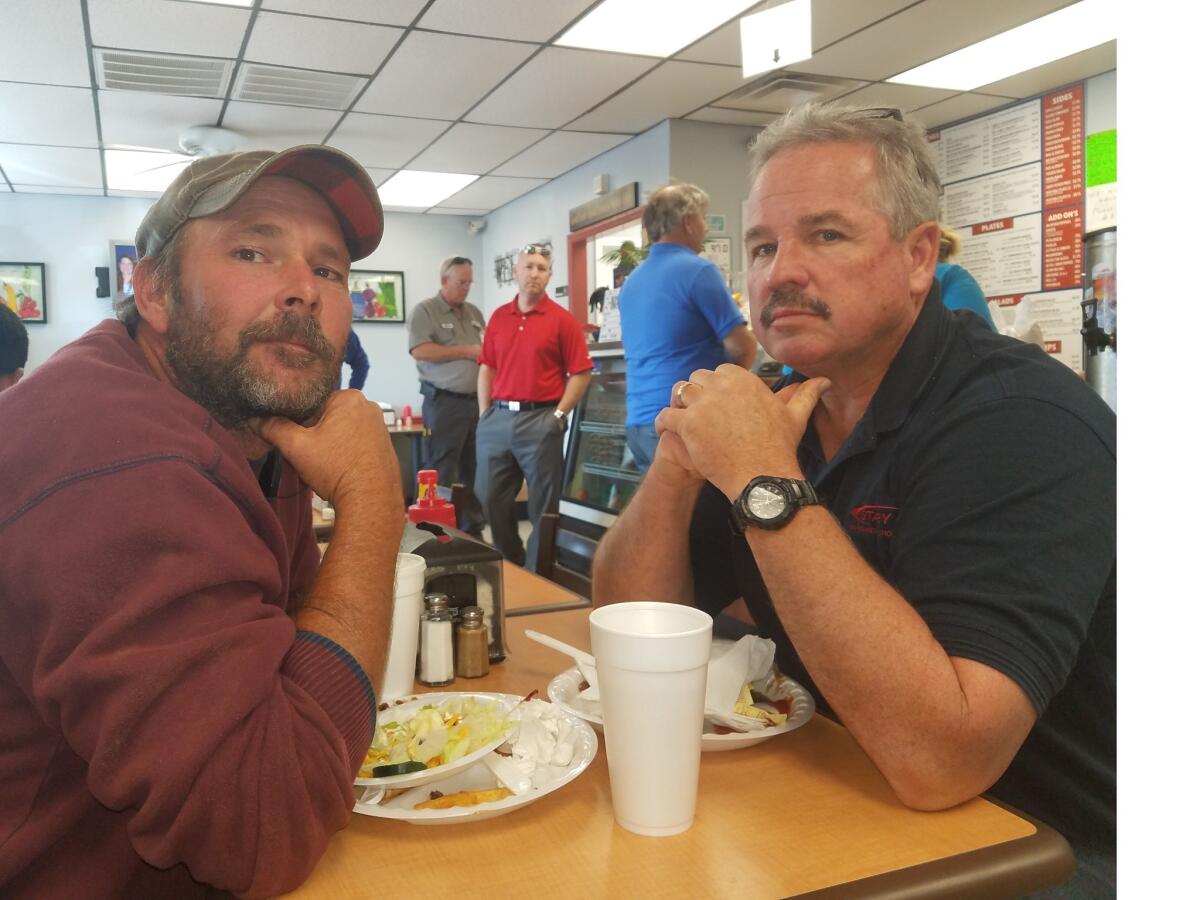Clinton and Trump supporters come from different Americas. Between them lies bitterness and distrust

Between the Clinton and Trump supporters lies bitterness and distrust. How are the groups different?
Reporting from Miami — At a posh Miami cafe the day after the election, a man worriedly monitored the stock market. His friend questioned whether the election had been rigged. At a nearby coffee shop, a barista tried to figure out why the data-driven websites she followed could have been so wrong.
It’s a safe bet that none of them had ever traveled to Stanley, a North Carolina rail town of 3,600 where construction workers, plumbers and an off-duty sheriff’s deputy watched Hillary Clinton’s concession speech from Pete’s Grill on Main Street.
“I don’t know anyone who would vote for Hillary Clinton,” said Terry Brown, a 55-year-old plumber.
“She should be locked up,” another diner said under his breath.
The fissure revealed in this election was as wide as any in recent history: between those who believe Donald Trump will destroy everything that America stands for and those who are certain it has already been so destroyed that only Trump can fix it.
Explore returns from the 2016 general election »
“Maybe I have a skewed vantage point because I live in a city,” said Hannah Ratcliff, the 25-year-old barista in Miami, still shaking her head at the thought of voters selecting a man her friends called an “idiot” to represent America around the world. “I just don’t think they run into the same sort of experiences. I know a lot of people that immigrated to this country, and they’re just horrified.”

The election made clear that, in many cases, Clinton and Trump supporters came from two Americas, with different life experiences and mutual distrust.
Clinton won the popular vote with supporters packed tightly into diverse urban clusters, with heavy immigrant populations, looser religious affiliations and greater educational and economic opportunities.
Trump’s electoral path spanned the country, largely bypassing those metropolises as it meandered through religious Southern towns, the vast rural heartland and the old industrial belt in the North that once provided the bedrock of the Democratic labor union coalition.
Trump’s supporters said throughout the campaign that they felt ignored by coastal elites whose influence over media, politics and culture seemed overwhelming. Many reveled in Clinton’s description of them as a “basket of deplorables,” seeing it as proof that they were looked down upon.
They worried about the encroaching societal changes and their effect on jobs, immigration and security — so worried that they were willing to take what many knew was a risk.

“We’re entering the unknown,” said Tommy Morrison, 55, the owner of a local drain and grease trap cleaning company in Stanley, who also voted for Trump. “The more educated, college-bred, liberal-thinking, progressive individuals see this country going backwards. I see it positively: We’re going back to the roots and Christian values we were founded on.”
He also offered an olive branch to Clinton, saying he admired her hard work and believed she loves the country even as she was held back by her baggage.
Samantha Miller, a 47-year-old paralegal, stood in the back of a rally in Virginia Beach last month, worried that America had become preoccupied with going “to third-world countries” to fight wars and aid others and needed to “take care of ourself” first.
“No one is here to help us,” she said.
Trump seized on that anxiety with nostalgia for a version of a post-World War II America, when overseas victories and the path to economic security for working-class whites were more clear-cut than they are in a modern world, with messy foreign clashes and fewer paths to economic prosperity for those without a college education.
He said repeatedly that his election represented a “last chance” to reclaim past greatness, and declared in his acceptance speech: “The forgotten men and women of our country will be forgotten no longer.”
Clinton’s supporters said they could not quite grasp the fury of Trump’s backers, which some blamed on racism or xenophobia. Many said on Wednesday that they continued to underestimate the other side’s frustration.
“There was just that sense of anger,” Richard Bloomingdale, president of the 800,000-member Pennsylvania AFL-CIO, who said he was shocked at the indifference many voters expressed when his members knocked on their doors and made calls for Clinton. “They didn’t care that [Trump] was a misogynist, or that he insulted disabled people,” he said. “They just didn’t care.”
He pointed to the largely white, fading industrial counties around Scranton and Wilkes-Barre, where Clinton fared far worse than President Obama only four years earlier. In Luzerne County, she won nearly 13,000 fewer votes than Obama.
The campaign trail laid bare each side’s conviction that the country would not just decline, but fall apart, if the other side won the election. And both sides were confident of victory, a belief reinforced by their social media feeds and the people they saw at the grocery store.
“I have a lot of friends on Facebook that are just praying for him,” said Bonnie Zink, a retired teacher from Sylva, N.C., who drove an hour from her home near the Smoky Mountains to see Trump at a fairgrounds in western North Carolina last month.
She and her husband, Jim, had tried to attend two previous rallies but could not get in because tickets were so scarce.
Zink was certain the country would collapse if Clinton won, as was Cathy Murph, a 54-year-old prison supervisor, who drove 50 miles to attend the same rally, her fifth of the election season.
“I’m terrified to even think in that realm,” she said. “I’d probably get sick on your shoes.”
Many of Clinton’s supporters, particularly minorities, say they are the ones who will be left behind in Trump’s America.
“I’ve been trying to process it all morning,” said Julius Hayes Jr., a 69-year-old African American Air Force veteran who is retired from a his child protection services job in Philadelphia.
He spent Wednesday exchanging phone calls and Facebook messages with his friends, who were equally stunned.
“He said all the things he said, and he was supported by the KKK and the Nazi party,” Hayes said. “You listen to the pundits, and they say people wanted a change in Washington — OK, but not this kind of change.”
In Latino households, Trump’s victory touched off tears and hushed conversations. Jose Martinez, 30, came to the U.S. from Puebla, Mexico, a decade ago, and runs a corner grocery in a blue-collar neighborhood in South Philadelphia, where immigrants from Mexico and Cambodia are taking the place of Italians and Jews who settled in earlier eras.
All morning, he said, his customers talked about what Trump would do. Some friends had children who came illegally and won temporary protection from deportation, under an Obama program that Trump has vowed to end. Martinez has two kids who were born in the U.S.
“My daughter was crying,” said Martinez, who has been staying in the U.S. on a series of temporary visas. “She thought we could get in trouble, and he would throw out everybody, and we’d have to leave.” He told her: “Don’t worry, we’ll be happy anywhere.”
Times staff writer Bierman reported from Miami and Times staff writer Tanfani from Philadelphia. Special correspondent Jarvie reported from from Stanley. Times staff writer Chris Megerian in New York contributed to this report.
ALSO
How Donald Trump put together such a strong showing
The man behind the USC/L.A. Times poll that predicted Trump winning: ‘To be honest, I was surprised’
More to Read
Get the L.A. Times Politics newsletter
Deeply reported insights into legislation, politics and policy from Sacramento, Washington and beyond. In your inbox three times per week.
You may occasionally receive promotional content from the Los Angeles Times.












